Stephen
With each milestone achieved, Stephen's successful recovery continued...
Stephen's condition was quite serious, requiring initial treatment at a general hospital in Houston due to pneumonia and pneumothorax.
Learn more about Stephen
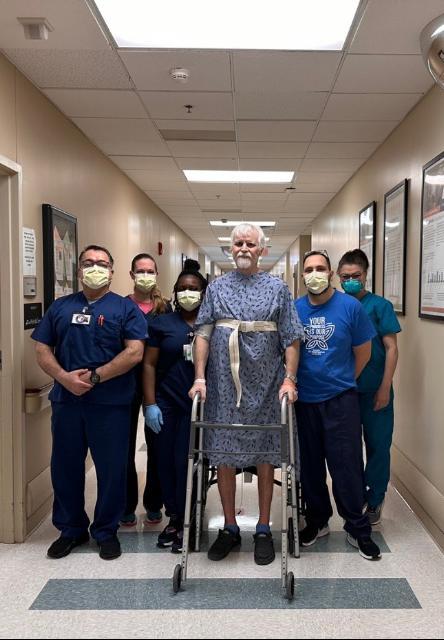 Stephen's condition was quite serious, requiring initial treatment at a general hospital in Houston due to pneumonia and pneumothorax. Unfortunately, his condition worsened, and he had to be placed on a ventilator and given a chest tube to stabilize him. After his condition stabilized, Stephen was transferred to Kindred Hospital Clear Lake, where he received further medical treatment and rehabilitation.
Stephen's condition was quite serious, requiring initial treatment at a general hospital in Houston due to pneumonia and pneumothorax. Unfortunately, his condition worsened, and he had to be placed on a ventilator and given a chest tube to stabilize him. After his condition stabilized, Stephen was transferred to Kindred Hospital Clear Lake, where he received further medical treatment and rehabilitation.
Upon admission, the care team at Kindred quickly evaluated Stephen condition and developed a personalized care plan tailored to his specific needs. Given that Stephen required total assistance with activities of daily living (ADLs), the team focused on providing comprehensive care to support his recovery. Remarkably, within just 2 1/2 weeks of his admission to Kindred, the care team was able to liberate Stephen from the ventilator. This significant achievement allowed Stephen to regain strength and mobility, enabling him to independently perform general ADLs, including ambulating with minimal assistance. These accomplishments demonstrate the effectiveness of the care plan and Stephen's determination in his recovery journey.
With each milestone achieved, Stephen's successful recovery continued, and he eventually reached a point where he could be discharged from Kindred Hospital to a lower level of care. This discharge marks a positive step forward in Stephen's rehabilitation process, where he can continue his recovery with appropriate support and assistance. From the entire staff at Kindred, we wish Stephen success in this recovery.
Derrick
Derrick's journey in the Intensive Care Unit at Kindred Hospital Clear Lake was a challenging one, but his determination and the unwavering support of the medical staff had propelled him toward recovery.
Learn more about Derrick
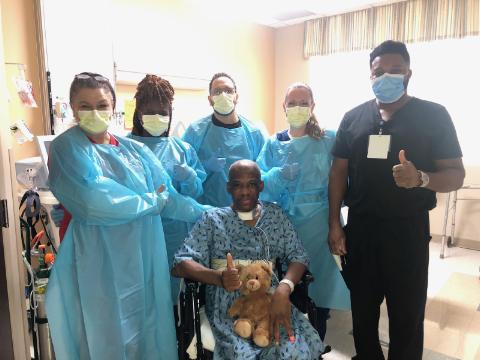 Derrick's journey in the Intensive Care Unit at Kindred Hospital Clear Lake was a challenging one, but his determination and the unwavering support of the medical staff had propelled him toward recovery. From the moment he was admitted with acute respiratory failure, Derrick embraced his role as an active participant in his own healing. Despite the initial uncertainty, he displayed an unwavering motivation that quickly became his guiding force.
Derrick's journey in the Intensive Care Unit at Kindred Hospital Clear Lake was a challenging one, but his determination and the unwavering support of the medical staff had propelled him toward recovery. From the moment he was admitted with acute respiratory failure, Derrick embraced his role as an active participant in his own healing. Despite the initial uncertainty, he displayed an unwavering motivation that quickly became his guiding force.
Under the careful guidance of the dedicated, physicians, nurses, therapy team (PT/OT/ST), Derrick pushed himself to the limit, working tirelessly to regain his strength. With each passing day, his progress became evident as he successfully weaned off the ventilator, his lungs breathing freely once again. The therapy sessions, though demanding, became moments of triumph as Derrick steadily improved his mobility and endurance.
As Derrick's time at Kindred Hospital Clear Lake drew to a close, a newfound hope filled the air. His eyes sparkled with anticipation as he spoke of reuniting with his beloved family. The thought of spending precious moments with his loved ones, once denied by his critical condition, now served as the beacon of his recovery. With his physical and emotional resilience, Derrick was ready to embark on the next chapter. Derrick discharged from Kindred where he continues his recovery. From all the staff at Kindred, we wish him all the success.
Noel
“Coming to Kindred was a great decision.”
Noel was active in the community and working prior to having difficulties breathing and admitted to a general hospital in Houston for an acute respiratory failure.
Learn more about Noel
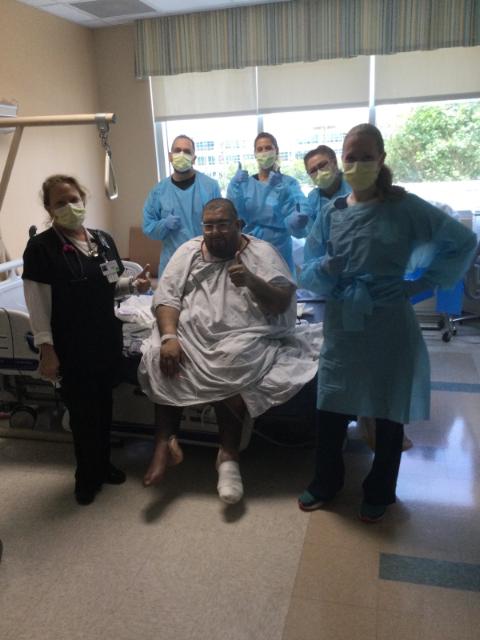 Noel was active in the community and working prior to having difficulties breathing and admitted to a general hospital in Houston for an acute respiratory failure. Once stable, he was transferred to Kindred Hospital Clear Lake to receive additional medical care, respiratory treatment to restore his lung function, wound care, and therapy. His care team worked with his admitting physician on a strategic care-plan that was best suited for Noel’s recovery.
Noel was active in the community and working prior to having difficulties breathing and admitted to a general hospital in Houston for an acute respiratory failure. Once stable, he was transferred to Kindred Hospital Clear Lake to receive additional medical care, respiratory treatment to restore his lung function, wound care, and therapy. His care team worked with his admitting physician on a strategic care-plan that was best suited for Noel’s recovery.
Dependent upon a ventilator during his admission at Kindred Hospital Clear Lake, Noel was heavily sedated due to elevated respiration, so the team had to start with moderate breathing exercises and rehab activities until he was able to breath on his own. As time progressed, Noel was able to breath on his own and no longer dependent upon the ventilator and became more motivated to recover with encouragement from family and staff. Participating in physical and occupational therapy, Noel’s condition improved with each treatment. Over the course of his twenty-nine days at Kindred, Noel was reevaluated by the care team, and had accomplished all the set goals in his care-plan. Upon discharge, Noel was able to stand and walk with minimal assistance and able to fully breath on his own. The entire staff at Kindred wishes Noel the best in his recovery.
“Coming to Kindred was a great decision. I was nervous and scared at first because it was all new to me. But the staff here are fantastic! Nurses treated me with the best care and made me feel comfortable during my stay. The respiratory team, physical therapist and wound care nurses worked with me and gave me great treatment and helped me recover quickly.”
Robert S
Robert, a retired police officer and active member of his community church, underwent a spinal surgery and had his left leg amputated below the knee.
Learn more about Robert S
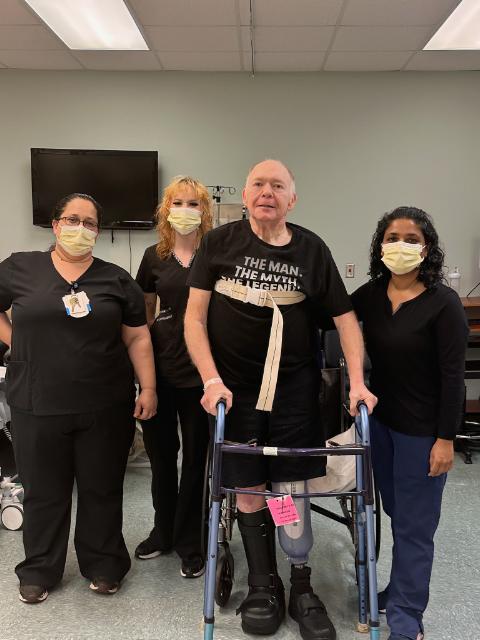 Robert, a retired police officer and active member of his community church, underwent a spinal surgery and had his left leg amputated below the knee. Unfortunately, he experienced septic shock and was placed on a ventilator and bedridden for many months. Once his condition stabilized, he was transferred to Kindred Hospital Clear Lake for further medical care and rehabilitation.
Robert, a retired police officer and active member of his community church, underwent a spinal surgery and had his left leg amputated below the knee. Unfortunately, he experienced septic shock and was placed on a ventilator and bedridden for many months. Once his condition stabilized, he was transferred to Kindred Hospital Clear Lake for further medical care and rehabilitation.
Upon admission, Robert was extremely fatigued and had balancing issues related to his spinal surgery and amputation. The initial stages of his treatment, were improving Robert's static sitting balance, considering the impact of his recent amputation. Gradually, he began working on wheelchair transfers using a slide board. Over time, with assistance, Robert was able to transfer using his prosthetic limb. Fatigue during therapy sessions posed a challenge for Robert initially. However, the OT/PT teams recognized his determination and adjusted his schedule accordingly. They divided his therapy sessions into two parts, one in the morning and one in the afternoon, to optimize his recovery and accommodate his energy levels. The PT team focused on transfer and gait training to help Robert adapt to his new prosthetic limb, while the OT treatments were centered around ADLs and selfcare.
With consistent effort and support, Robert made significant progress. By the time of his discharge from Kindred Hospital Clear Lake, he had achieved the ability to walk with his prosthetic limb and perform activities of daily living (ADLs). Robert was discharged to a lower-level care for additional rehab. From the entire team at Kindred, we wish him all the success in his recovery.
Rachel
Rachael was admitted to a general hospital in Houston, after experiencing respiratory failure.
Learn more about Rachel
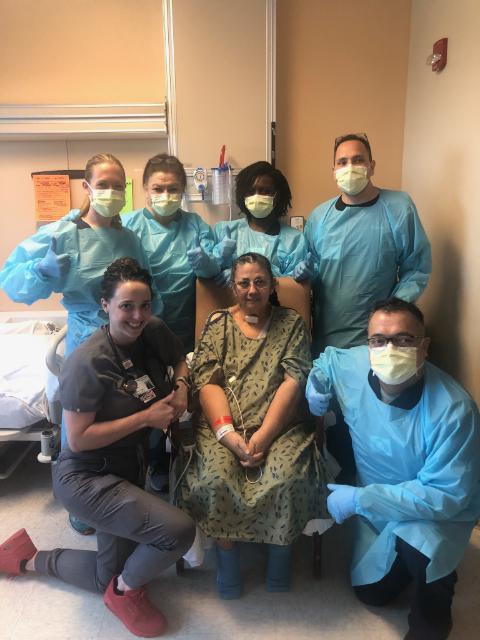 Rachael was admitted to a general hospital in Houston, after experiencing respiratory failure. Her condition deteriorated, leading to the need for a ventilator to assist with breathing. After further evaluation, Rachael was diagnosed with botulism, a rare illness caused by toxins that attack the body's nerves, resulting in difficulties breathing and muscle paralysis. Once her condition stabilized, Rachael was transferred to Kindred Hospital Clear Lake to receive specialized medical care and rehabilitation.
Rachael was admitted to a general hospital in Houston, after experiencing respiratory failure. Her condition deteriorated, leading to the need for a ventilator to assist with breathing. After further evaluation, Rachael was diagnosed with botulism, a rare illness caused by toxins that attack the body's nerves, resulting in difficulties breathing and muscle paralysis. Once her condition stabilized, Rachael was transferred to Kindred Hospital Clear Lake to receive specialized medical care and rehabilitation.
Upon admission to Kindred, Rachael's dedicated care team immediately focused on liberating her from the ventilator. This goal was crucial as it would improve her breathing and ultimately increase her strength, enabling her to undergo intensive rehabilitation. Over the course of 14 weeks, Rachael's care team diligently worked to achieve this milestone successfully. Initially, Rachael faced medical acuity and weakness, but she remained motivated to regain her strength and mobility. With the assistance of physical therapy (PT) and occupational therapy (OT), she tirelessly worked towards her goal. Through their guidance and support, Rachael gradually regained her strength, allowing her to engage in activities of daily living (ADLs) and eventually walk with the aid of an assistive device.
Rachael's speech-language pathologist (SLP) played a crucial role in improving her communication abilities after being weaned from the ventilator. This included helping her enhance her speech and language skills. Additionally, respiratory therapy (RT) focused on strengthening Rachel's lung muscles, ensuring her readiness for the challenges that lay ahead. Rachael's determination and hard work led her to surpass the goals set in her care plan. As a result, she was discharge to a lower level of care, where she would continue her recovery journey. From the entire staff at Kindred, we wish her the best in her recovery.
Royce
“My stay and experiences here at Kindred Clear Lake have been outstanding.”
Royce experienced a heart attack and was quickly taken to a local hospital in Houston.
Learn more about Royce
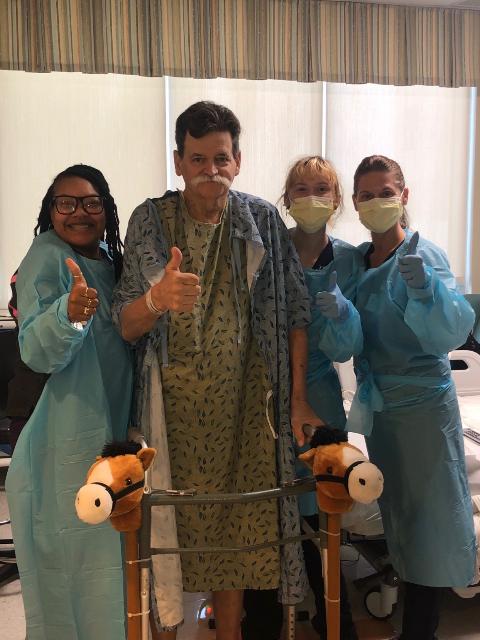
Royce experienced a heart attack and was quickly taken to a local hospital in Houston. There, he required intubation and was placed on a ventilator to assist with his breathing. Fortunately, his time on the ventilator was brief. However, due to his medical needs, Royce was transferred to Kindred Hospital Clear Lake for further medical care.
Due to the extended period of immobility, Royce was in a weakened state upon admission.
While at Kindred, Royce received extensive rehabilitation, respiratory therapy, and wound care. The wound care team promptly attended to his sacral wound. Additionally, the physician and pharmacist collaborated to administer the appropriate antibiotics. This approach aims to promote wound healing and ensure a successful recovery.
Royce's motivation to get back to normal played a significant role in his progress. His diligent efforts in working with his therapists and following the care plan contributed to his successful recovery. As he built additional body strength and improved his respiratory function, he gained the ability to ambulate on his own, indicating significant progress in his rehabilitation journey. Royce received respiratory therapy to support his breathing. This included respiratory treatments and breathing exercises aimed at improving his lung function and strengthening his respiratory muscles.
Royce was discharged home and is excited to be back with his family. He said “My stay and experiences here at Kindred Clear Lake have been outstanding. I can’t say enough about the staff - they were effective and very caring. In a couple months here, I have forged some wonderful relationships!”
Julie
“My caregivers are my angels and I am very blessed.”
Julie was re-admitted to Kindred Hospital Clear Lake after she had been
discharged to a rehab facility. Her pulmonary status had worsened and was
placed on a ventilator again; Julie also developed a pressure wound from
prolonged bed rest, which required advanced wound care.
Learn more about Julie
 Her respiratory therapists began a course of aggressive treatments to
strengthen her lungs and Julie responded well to her therapies. Her progress
was gradual, but Julie was finally weaned from the vent. She regained the
ability to use her voice and begin a regular diet with help from her
speech-language pathologist. During her stay at Kindred, Julie made
remarkable progress. Despite a few setbacks, Julie was always an eager
participant in rehab therapy sessions, ready to regain her mobility and
independence. With her wound nearly healed, she is now able to ambulate with
a rolling walker and manage all the tasks of daily life.
Her respiratory therapists began a course of aggressive treatments to
strengthen her lungs and Julie responded well to her therapies. Her progress
was gradual, but Julie was finally weaned from the vent. She regained the
ability to use her voice and begin a regular diet with help from her
speech-language pathologist. During her stay at Kindred, Julie made
remarkable progress. Despite a few setbacks, Julie was always an eager
participant in rehab therapy sessions, ready to regain her mobility and
independence. With her wound nearly healed, she is now able to ambulate with
a rolling walker and manage all the tasks of daily life.
“Seven months ago, I couldn’t breathe or walk or even feed
myself,” Julie shared. “Now, with all the help I’ve
received from everyone on staff, I can do all these things again. My
caregivers are my angels and I am very blessed.”
Robert
“The care I received here at Kindred Clear Lake gave me a sense of
family.”
Robert is a retired police officer who is very active in his community and his
church. After suffering with back pain for many years, the discomfort became
unbearable and he had to be admitted to an acute care facility.
Learn more about Robert
 Robert was diagnosed with thoracic discitis – a vertebral disc
infection – that was causing him to feel extreme pain in his chest,
hips and legs. He began to receive treatment, and when stabilized he was
transferred to Kindred Hospital Clear Lake. Under the care of a team of
physicians, therapists, nurses and caregivers, Robert began to make
progress. As his pain levels were managed and he started to do more with
help from his rehab team, he progressed from being bedbound to getting up
into a wheelchair and reclaiming his independence. Although he was reluctant
at first to participate fully in his therapy sessions, with support and
encouragement from his wife, family and caregivers, Robert finally began to
see and feel the progress he was making. He soon met all of the goals set
for his recovery and he was able to return home.
Robert was diagnosed with thoracic discitis – a vertebral disc
infection – that was causing him to feel extreme pain in his chest,
hips and legs. He began to receive treatment, and when stabilized he was
transferred to Kindred Hospital Clear Lake. Under the care of a team of
physicians, therapists, nurses and caregivers, Robert began to make
progress. As his pain levels were managed and he started to do more with
help from his rehab team, he progressed from being bedbound to getting up
into a wheelchair and reclaiming his independence. Although he was reluctant
at first to participate fully in his therapy sessions, with support and
encouragement from his wife, family and caregivers, Robert finally began to
see and feel the progress he was making. He soon met all of the goals set
for his recovery and he was able to return home.
“The care I received here at Kindred Clear Lake gave me a sense of
family,” Robert shared. “I knew that if I needed help it was
going to be there. All of the staff here are caring professionals and I
walked away with a sense of being loved, which is critical to people in my
position. If I should ever have to go through this again, the people at
Kindred would be my first choice. I felt I was their top priority.”
Thomas
“I am so glad I had therapists and caregivers who pushed me to
succeed!”
Thomas was working full time and lived at home with his wife until he started
to have difficulty breathing and began to feel extreme muscle weakness and
anxiety.
Learn more about Thomas
 He was admitted to a general hospital and was diagnosed with acute
pancreatitis and respiratory failure, requiring him to be placed on a
ventilator and started on treatments to stabilize his condition. Thomas was
then transferred to Kindred Hospital Clear Lake to receive respiratory
therapy, wound care, ongoing medical care and rehabilitation. At the
beginning of his stay Thomas was still experiencing extreme anxiety which
made initial treatments difficult, but once his team of caregivers gained
his trust he started to participate in therapy sessions and allow his wound
care nurse to administer treatment. Thomas progressed sufficiently to be
weaned from the ventilator and have the breathing tube removed, and he also
was able to start walking again with the aid of a rolling walker and regain
his independence over the tasks of daily life.
He was admitted to a general hospital and was diagnosed with acute
pancreatitis and respiratory failure, requiring him to be placed on a
ventilator and started on treatments to stabilize his condition. Thomas was
then transferred to Kindred Hospital Clear Lake to receive respiratory
therapy, wound care, ongoing medical care and rehabilitation. At the
beginning of his stay Thomas was still experiencing extreme anxiety which
made initial treatments difficult, but once his team of caregivers gained
his trust he started to participate in therapy sessions and allow his wound
care nurse to administer treatment. Thomas progressed sufficiently to be
weaned from the ventilator and have the breathing tube removed, and he also
was able to start walking again with the aid of a rolling walker and regain
his independence over the tasks of daily life.
“I am grateful and can only say this much – we often don’t
like what we need the most,” Thomas shared. “I am so glad I had
therapists and caregivers who pushed me to succeed!”
Paula
Kindred helped Paula return home.
Paula lived at home and enjoyed spending time with her daughters until she
began to experience abdominal pain when she developed an abnormal intestinal
wound.
Learn more about Paula
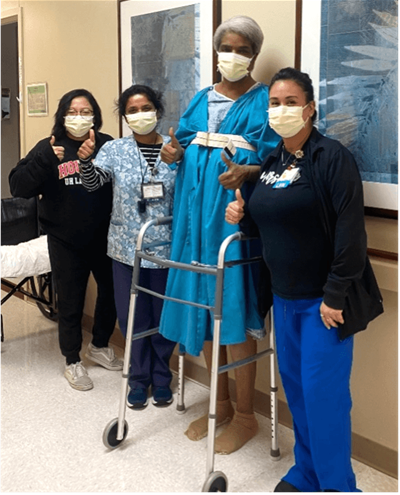 She was admitted to an acute care facility and then transferred to Kindred
Hospital Clear Lake where she could receive advanced wound care. At the
beginning of her stay, Paula was in significant pain and apprehensive about
her rehab therapy due to her weakness and lack of mobility. Her wound care
team together with her physicians and caregivers helped her manage her pain
and become accustomed to the equipment needed to help resolve her complex
wound. As she became stronger and her wound began to heal, Paula was able to
do more activities with her rehab therapists and progressed to being able to
get up from bed, regain her independence, and walk with the aid of a rolling
walker. Prior to her discharge Paula was given instruction on how to
continue managing her wound so she could return home with her family and she
looked forward to getting back to her normal life.
She was admitted to an acute care facility and then transferred to Kindred
Hospital Clear Lake where she could receive advanced wound care. At the
beginning of her stay, Paula was in significant pain and apprehensive about
her rehab therapy due to her weakness and lack of mobility. Her wound care
team together with her physicians and caregivers helped her manage her pain
and become accustomed to the equipment needed to help resolve her complex
wound. As she became stronger and her wound began to heal, Paula was able to
do more activities with her rehab therapists and progressed to being able to
get up from bed, regain her independence, and walk with the aid of a rolling
walker. Prior to her discharge Paula was given instruction on how to
continue managing her wound so she could return home with her family and she
looked forward to getting back to her normal life.
Allison
“I am very grateful for the effort your team of therapists put
forth.”
After Allison experienced a severe brain hemorrhage she was first admitted to
a general hospital and then transferred to Kindred Hospital Clear Lake for
ongoing treatment and rehabilitation.
Learn more about Allison
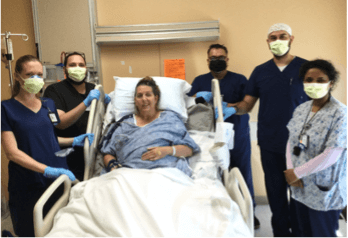 When she first arrived she was disoriented and lethargic and unable to eat
or drink. Under the care of an interdisciplinary team, and with her mother,
Judy, at her side, she began to receive rehabilitation therapy to help her
regain her fine motor skills, strength, balance and coordination.
Allison’s speech pathologist worked closely with her to enable her to
be able to swallow and regain her speech and cognition. At the beginning,
her team worked to overcome the effects of the brain injury she had
suffered, and their ongoing efforts began to pay off when Allison started to
participate actively in her therapy sessions and steadily began to improve.
Within a short period of time she was able to tolerate sitting up in a chair
and was eating a drinking a normal diet. After a few weeks at Kindred,
Allison was ready to move on to the next part of her journey to recovery and
back home to her family and children.
When she first arrived she was disoriented and lethargic and unable to eat
or drink. Under the care of an interdisciplinary team, and with her mother,
Judy, at her side, she began to receive rehabilitation therapy to help her
regain her fine motor skills, strength, balance and coordination.
Allison’s speech pathologist worked closely with her to enable her to
be able to swallow and regain her speech and cognition. At the beginning,
her team worked to overcome the effects of the brain injury she had
suffered, and their ongoing efforts began to pay off when Allison started to
participate actively in her therapy sessions and steadily began to improve.
Within a short period of time she was able to tolerate sitting up in a chair
and was eating a drinking a normal diet. After a few weeks at Kindred,
Allison was ready to move on to the next part of her journey to recovery and
back home to her family and children.
“I am very grateful for the effort your team of therapists put forth
to prepare Allison for the next part of her journey to wellness,” Judy
said before her daughter was discharged.
Alberta
“I can’t believe I’m getting close to being able to leave
Kindred and go home!”
Alberta was admitted to a general hospital when she developed shortness of
breath and was diagnosed with COVID-19.
Learn more about Alberta
 She had to be placed on a ventilator and started on IV antibiotics for
pneumonia and sepsis. She remained at the facility until she was able to be
transferred to Kindred Hospital Clear Lake to receive respiratory therapy
and rehabilitation. Shortly after she was admitted Alberta began to receive
pulmonary therapy and was able to be weaned successfully from the
ventilator. She then started to become more engaged with her recovery and
worked with her physical and occupational therapists to recover her fine
motor skills, strength and mobility. With constant support and encouragement
from her family and caregivers Alberta steadily progressed from being
bedbound and completely dependent, to being able to get up from her bed,
stand with some assistance and reclaim her independence over the activities
of daily life.
She had to be placed on a ventilator and started on IV antibiotics for
pneumonia and sepsis. She remained at the facility until she was able to be
transferred to Kindred Hospital Clear Lake to receive respiratory therapy
and rehabilitation. Shortly after she was admitted Alberta began to receive
pulmonary therapy and was able to be weaned successfully from the
ventilator. She then started to become more engaged with her recovery and
worked with her physical and occupational therapists to recover her fine
motor skills, strength and mobility. With constant support and encouragement
from her family and caregivers Alberta steadily progressed from being
bedbound and completely dependent, to being able to get up from her bed,
stand with some assistance and reclaim her independence over the activities
of daily life.
“I can’t believe I’m getting close to being able to leave
Kindred and go home!” Alberta shared. “The dedication and hard
work from all the people here helped me to progress quickly. I would
recommend this hospital to anyone and praise God for his mercy.”